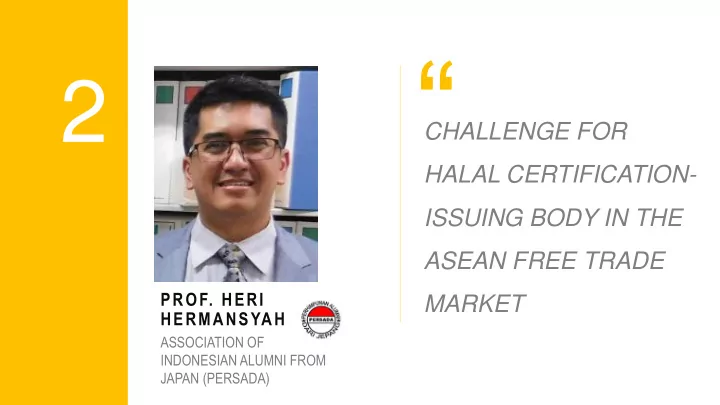

“ 2 CHALLENGE FOR HALAL CERTIFICATION- ISSUING BODY IN THE ASEAN FREE TRADE PROF. HERI MARKET HERMANSYAH ASSOCIATION OF INDONESIAN ALUMNI FROM JAPAN (PERSADA)
Halal Policy and Certification in Indonesia Prof. H. Heri Hermansyah, Ph.D
INDONESIA • The 4 th largest population country in the world under China, India, and USA • The largest population country in South East Asia • With population of 261 million people in 2016 (Source: World Bank, 2016)
INDONESIA • The largest Muslim population country in the world (>225 million people) • Muslim population percentage reach 88.1% of Indonesian population • Indonesian Muslims reaches up to 12.7% of the world Muslim population • large marketplace of halal food
OUTLINE 1 2 Halal Definition Halal Policies in and Concept Indonesia 3 4 Halal Certification in Halal-Haram Cases Indonesia in Indonesia 5
1 Halal Definition and Concepts
Halal Definition • HALAL comes from Arabic means permissible or lawful (Halal Food Authority, 2008) • In the case of diets and foods, most of them are considered to be halal unless they are specified or mentioned in the Qur'an, Al Hadits, Ijma ’, Qiyas, and Fatwa
Halal in Al Qur’an – Halal (lawful) and Thoyyib (good); – “ Forbidden to you (for food) Are: dead meat, blood, The flesh of swine, and that On which hath been invoked The name of other than Allah”
Halal Food Concepts • Halal food means food permitted under the Islamic law that fulfils the following conditions: – meat or any ingredient derived from an animal after slaughter must be from a species of animal that is acceptable as Halal and be slaughtered by the Halal religious slaughter method ; – other foods or ingredients must not contain any ingredients that are Haram according to Shariah law such as alcohol; – the food must be safe, wholesome and not harmful ; – during preparation, processing, manufacture or storage the food must not be cross-contaminated by Haram materials ; – the food or its ingredients must not contain any human parts or derivatives . (Source: The Society of Food Hygiene and Technology)
Halal Concept in Indonesia • Halal concept in Indonesia written in Halal Assurance System (HAS) • HAS is an integrated management system which is establish, implemented, and maintained to manage materials, production processes, products, human resources, and procedures in order to maintain the sustainability of halal production process in accordance with standards requirements
2 Halal Policies in Indonesia
Halal Policies in Indonesia • Regulations of Halal Product Warranty No. 33 of 2014 – Article 1 • Products are goods and / or services related with food, beverages, medicine, cosmetics, products chemicals, biological products, genetic engineering products, as well as goods used, used, or utilized by the Community. – Article 4 • Products that are, circulated, and traded in the region Indonesia must be halal certified. • Halal Assurance System (HAS 23000) LPPOM MUI
3 Halal Certification in Indonesia
Halal Certification • Halal certification is a process to obtain halal certificate through several stages to prove that materials, facilities, production processes and halal assurance system are meet the standards
Halal Certification in Indonesia • Halal certification in Indonesia handled by Indonesian Council of Ulama/ Majelis Ulama Indonesia (MUI)
Halal Certification in Indonesia • Majelis Ulama Indonesia (MUI) has 2 authority bodies to handle halal certification: – LPPOM MUI (Lembaga Pengkajian Pangan, Obat- obatan dan Kosmetika/ Institute for Assessment of Food, Drugs and Cosmetics) – Fatwa Committee
LPPOM MUI • Institute for Assessment of Food, Drug and Cosmetic, The Indonesian Council of Ulama is an institution formed by MUI to run MUI function in protecting muslim consumers in consuming products of foods, drugs, and cosmetics. • Conduct an audit and give a decision based on audit results (Scientific judgement) • LPPOM MUI assists the company for scientific perspective
Fatwa Committee • One of MUI committees whose task to produce an Islamic legal opinion about law status on certain case • Members of fatwa committee are representative of Islamic organizations in Indonesia • Give a decision based on Islamic Law and audit results from LPPOM MUI • MUI Fatwa Committee for the Islamic Law (Syariah) perspective
Halal MUI Certification Standards • The foundation of standard development Halal MUI: 1. Islamic Law 2. Scientific study 3. Culture • LPPOM MUI released the concept of a Halal Assurance System HAS 23000 as Halal Certification Standard
Halal MUI Certification Requirements • Meets the Halal Assurance System (HAS) criteria • Follow every step of the halal certification procedure (HAS 23000)
Halal Certification Process Product Certification Document Audit Material Memorandum no yes no yes Ulama’s Fatwa Registration Product Audit Audit Evaluation Appropriate Halal Certificate HAS Document 1 HAS Document 2 HAS: Halal Assurance System
Criteria of Halal Assurance System 1. Halal Policy 2. Halal Management Team 3. Training and Education 4. Materials 5. Products 6. Production Facilities 7. Written Procedures for Critical Activity 8. Ability to Search 9. Handling Products that do not meet the Criteria 10. Internal Audit 11. Management Review
4 Halal-Haram Cases in Indonesia
Ajinomoto Products Suspected Containing Porcine • In 2000, Bactosoytone was considered to be haram as a bacterial growth media for MSG Production due to porcine substance in the media. • 3500 ton product (equal 55 billion IDR) was withdrawn from the market and Clarification to society • Bactosoytone was replaced by mameno and then re- audit by MUI
THANK YOU
REFERENCES Hakim, Lukmanul. The Principles of Halal Food . LPPOM MUI. Zulaekah, Siti dan Kusumawati, Yuli. 2005. Halal Dan Haram Makanan Dalam Islam . Available from: https://www.researchgate.net/publication/277226802_HAL AL_DAN_HARAM_MAKANAN_DALAM_ISLAM [accessed Aug 20, 2017]. Jati, Sumunar. Sertifikasi Halal MUI. LPPOM MUI. Panduan Umum Sistem Jaminan Halal. 2008. LPPOM MUI. Understanding Halal. The Society of Food Hygiene and Technology.
Recommend
More recommend